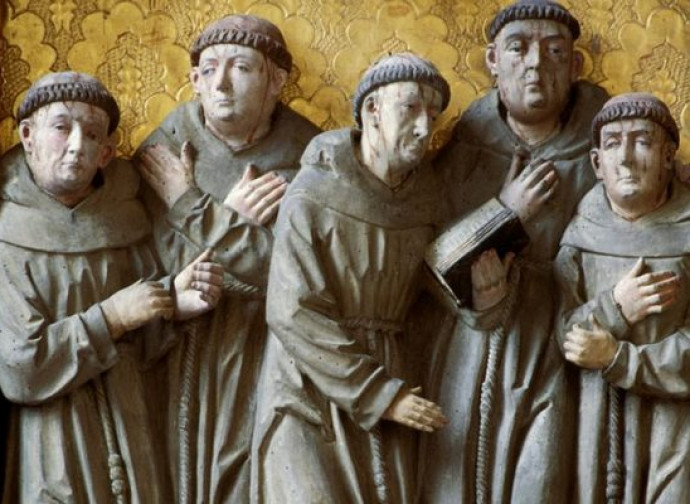Franciscan proto-martyrs
Saint Francis had sent them to announce the Gospel to Muslims in Spain and Morocco. The friars Berard, Otho, Peter, Accursius and Adjutus received the blessing from Francis on the day of Pentecost and started their journey towards Spain, when the actual Reconquista was still far away (it took place only in 1492).

Saint Francis had sent them to announce the Gospel to Muslims in Spain and Morocco. The Franciscan mission began in 1219, responding to the saint of Assisi’s wish who that same year, with the 5th crusade under way to free the holy places of Palestine, travelled to Egypt and walked unharmed into the Sultan's camp to urge him to convert, telling him that he and his subjects were blaspheming the name of Christ. It was in this historical context that the friars Berard, Otho, Peter, Accursius and Adjutus received the blessing from Francis on the day of Pentecost and started their journey towards Spain, when the actual Reconquista was still far away (it took place only in 1492). Their mission was also partaken by a sixth Franciscan, Vitalis, who, however, upon arrival in the kingdom of Aragon had to desist because of an illness.
The five missionaries continued their journey under Berard's guidance and arrived in Coimbra, where they were received by Urraca, queen of Portugal, who was impressed by their virtues. They then stopped at Alenquer, where they met the sister of King Alphonsus II, the Blessed Sancha of Portugal, an abbess who gave them some ordinary clothes. They then arrived in Seville where, after resting for a week at the home of a Christian, they resumed their religious habits and went to preach the Gospel in a mosque, exposing the falsity of Mohammed's teachings, which caused them to be expelled violently. Undeterred, they presented themselves to the caliph, who thought of killing them as soon as they tried to persuade him to convert ; but after listening to his advisors and left them free to leave for Morocco, warning them to stop preaching in the name of Jesus.
As soon as they arrived in Morocco, aboard a vessel of Pedro, Infante of Portugal (brother of Alphonsus II), the friars resumed their preaching the Christian message on the streets, so the local caliph ordered their immediate expulsion. The Infante Pedro escorted them on his way to boarding from Ceuta, but halfway there the five managed to escape vigilance and heroically returned to preach in Morocco, arousing the anger of the caliph, who locked up them for 20 days in an underground prison without food or water: they were then freed since the caliph had been informed that, after the forced fast, the friars were in better health than before. They tried to resume their mission, but some Christians stopped them for fear of retaliation. They were again led to Ceuta, and again managed to free themselves.
They were then made to follow an expedition of Muslim and Christian soldiers who had joined forces to stop an internal rebellion; while the army risked dehydration, Berardo dug a pit in the desert, from which an abundant spring gushed, only to dry up when the soldiers left. The caliph was informed of the miracle by his own son, who had been an eyewitness, but in vain. After his initial surprise, infuriated by the tenacity of the friars who wanted to pursue their mission, he had them flogged and imprisoned. They were then dragged through the streets over broken glass, and boiling oil was poured on their skin, but they endured the ordeal with extraordinary dignity. Struck by their resistance, the caliph tried to convert them to Islam by promising wealth and women. On their umpteenth refusal, he ordered their beheading, which took place in Marrakesh on January 16th, 1220.
After the outrages they suffered including those post-mortem, the bodies of the five Franciscan proto-martyrs were recovered by the Portuguese and taken to Coimbra. Here, a young regular canon was so impressed by their martyrdom that in turn he decided to join the Franciscans and went to Morocco to continue the proclamation of Christ (the mission was unsuccessful due to a tropical disease that incapacitated him for months): that young man was Saint Anthony of Padua; a year later he would meet Saint Francis who, on learning about the friars' martyrdom, said: "Now I can say with certainty that I have five true Friars Minor."
